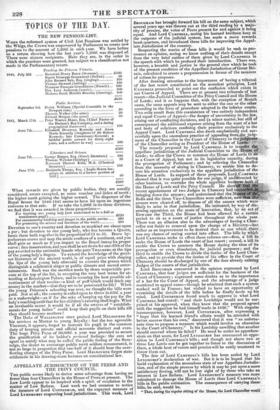TOPICS OF THE DAY.
THE NEW PENSION-LIST.
WHEN the reformed system of Civil List Pensions was settled by the Whigs, the Crown was empowered by Parliament to create new pensions to the amount of 1,200/. in each year. We have before us a return showing how the last year's 1,200/. was disposed of. There were sixteen recipients. Here they are, in the order in which the pensions were granted, but subject to a classification not made in the Parliamentary return.
Teaching the Princess Victoria.
1840, July 234 Reverend Henry Barez (German) Signor Giuseppe Guazzaroni (Italian) John Bernard Sale, Esq. (singing) Thomas Steward (writing) Monsieur Francois Grandineare (French) Mrs. Lucy Anderson (music) Madame Sarah Matilda Bourdin (dancing) Public Services. £100 50 100 100 100 100 100 ./.650
September 9th Henry Williams (Special Constable in the
Newport riots) 20
Thomas Walker (the same) 20
Edward Morgan (the same) 20 1841,
March 17th ... Peter Warren Deese, Esq. (Chief Factor of
the Hudson's Bay Company, ands daring
geographical discoverer) 100
June 7th Elizabeth Devereux Kennedy and Anna
Maria Kennedy (daughters of Sir Robert
Kennedy. late Commissary-General; a faithful public servant for thirty -eight
years, and a sufferer in war) 100
£260
Literature and Science. 100
June 7th George Borges, Esq. (Greek literature) ...
Thomas Webster (Geology) 50
Reverend Thomas Kidd, M.A. (Classical
literature) 100
June 17th Benjamin Thorpe, Esq. (Anglo-Saxon lan- guage, in addition to a former pension of
1600 40
£290
When rewards are given by public bodies, they are usually considered, errors excepted, as some voucher and index of merit ; the higher merit gaining the higher reward. The dispenser of the Royal favour for 1840-1841 seems to have hit upon an ingenious converse to that rule. If we take the 1,200/. in its three divisions, we find tbat it was awarded in these proportions— For teaching one young lady (not understood to be a dull or
troublesome pupil) .£650
For encountering hardship and danger in the public service 260
For promoting the science and literature of the world 290
Devotion to one's country and devotion to mankind are about upon a par ; but devotion to one young lady, who has become a Queen, beats them both together in the proportion'of 65 to 55. Brave hy- perborean snows and map the arctic confines of a continent, and you shall gain as much as if you impart to the Royal instep its proper curve ; face insurrection, and you shall be set down for one-fifth of the pay awarded to the estimable female who puts THALBERG at the tips of the young lady's fingers. To extend the knowledge of the great- est literature of the ancient world, is of equal price with shaping the lips of the young lady aforesaid to execute the graces which distinguish a celebrated singer at public dinners and sacred enter- tainments. Such was the sacrifice made by those respectable per- sons at the top of the list, in accepting the very best terms for at- tending at Kensington Palace, and in securing the best possible ad- vertisement of their merits—a kind of puff which would fetch any _money in the market—that they are to be pensioned for life! When the young Princess's schooling was over, we thought the bills were paid. Not at all ; the country is called upon to throw in 6501. a year as a makeweight—as if for the sake of keeping up the pay for the lady's teaching until that for her children's tutoring shall begin. What an invaluable secret it would be if all the owners of "establish- ments for young ladies" could keep their pupils on their bills till they should become mothers ! The Duke of WELLINGTON once praised Lord MELBOURNE for his services as Mentor to young Royalty : but the too agreeable Viscount, it appears, forgot to instruct his pupil in the common duty of keeping private and official accounts distinct and even. The huge Privy Purse of 60,0001. a year was provided to secure the gratification of its holder's personal feelings : the sum set apart to satisfy what may be called the public feeling of the Sove- reign, the desire to encourage public merit seldom remunerated, is not so large in proportion that one-half of it should bear the over- flowing charges of the Privy Purse. Lord MELBOURNE forgot state arithmetic in his drawing-room lectures on constitutional law.


























 Previous page
Previous page